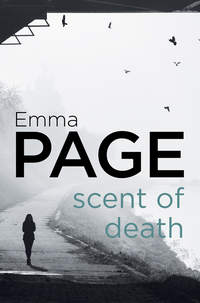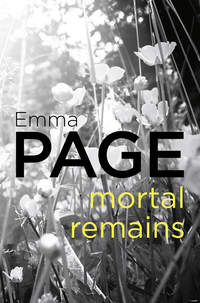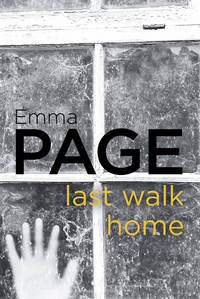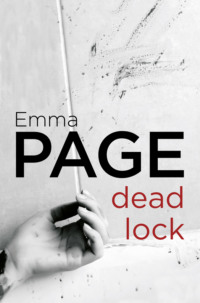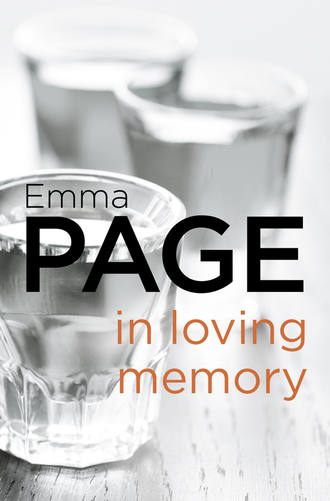
Полная версия
In Loving Memory


COPYRIGHT
Harper An imprint of HarperCollinsPublishers 1 London Bridge Street London SE1 9GF
www.harpercollins.co.uk
First published in Great Britain in 1970 by Collins Crime
Copyright © Emma Page 1970
Emma Page asserts the moral right to be identified as the author of this work
A catalogue copy of this book is available from the British Library.
This novel is entirely a work of fiction. The names, characters and incidents portrayed in it are the work of the author’s imagination. Any resemblance to actual persons, living or dead, events or localities is entirely coincidental.
All rights reserved under International and Pan-American Copyright Conventions. By payment of the required fees, you have been granted the nonexclusive, nontransferable right to access and read the text of this e-book on-screen. No part of this text may be reproduced, transmitted, downloaded, decompiled, reverse-engineered, or stored in or introduced into any information storage and retrieval system, in any form or by any means, whether electronic or mechanical, now known or hereinafter invented, without the express written permission of HarperCollins e-books.
HarperCollinsPublishers has made every reasonable effort to ensure that any picture content and written content in this ebook has been included or removed in accordance with the contractual and technological constraints in operation at the time of publication.
Source ISBN: 9780008175962
Ebook Edition © MARCH 2016 ISBN: 9780008175979
Version [2016-02-18]
CONTENTS
Cover
Title Page
Copyright
Chapter 1
Chapter 2
Chapter 3
Chapter 4
Chapter 5
Chapter 6
Chapter 7
Chapter 8
Chapter 9
Chapter 10
Chapter 11
Chapter 12
Chapter 13
Chapter 14
Chapter 15
Chapter 16
Chapter 17
Chapter 18
Chapter 19
Chapter 20
About the Author
By Emma Page
About the Publisher
CHAPTER 1
TWO O’CLOCK in the morning. A silent hour, the time of darkness, of the first deep sleep. A stirring in the tall thick branches of the great trees standing sentinel at the rear of Whitegates, the sudden melancholy screech of a night-owl, a rustling of fieldmice in the thick carpet of old leaves.
In the bedroom next door to old Mr Mallinson’s room, Mrs Parkes woke with a start, coming at once to full consciousness from long years of training and habit. She put out a hand and pressed the switch at the base of the bedside lamp, glanced at the little clock, screwing her eyes up against the light.
She turned her head in the direction of Mr Mallinson’s room, remaining rigid, listening.
The sound of confused movement, Mr Mallinson’s voice calling her name … ‘Mrs Parkes! Mrs Parkes!’ A window being flung open.
‘It’s all right! I’m coming!’ She snatched at a dressing-gown, shrugged it on and drew the cord tightly round her waist.
‘It’s all right,’ she said again with professional reassurance, opening the connecting door and going through into the old man’s room. ‘I’m here, don’t worry.’ He was standing in his pyjamas, leaning out of the window, drawing great gasping breaths of air.
‘What is it?’ She put a hand on his shoulder. He remained where he was, struggling for breath, unable to speak.
A whisper of footsteps in the corridor, a low double knock at the door. The handle turned and Gina Thorson put her face round the door. She looked anxiously at Mrs Parkes.
‘I heard you get up. Is there anything I can do?’ Her young, pretty face looked frightened, her eyes asked a question of Mrs Parkes … What’s the matter? Is he having some kind of attack? Is he very ill?
‘Run down and ring Doctor Burnett.’ Mrs Parkes took a dressing-gown from behind the door and draped it round the old man’s shoulders. He seemed unaware of her action. He was clutching at his chest now, breathing as deeply as he could, striving to conserve strength, to fight, to hang on. ‘Tell him I think it’s Mr Mallinson’s heart. Ask him to come over right away. I’ll stay here.’
Gina closed the door and ran silently and swiftly along the corridor, down the long curving flight of stairs into the hall, switching on lights as she went. She dialled the number rapidly, stood listening to the brr … brr … willing Doctor Burnett to wake up, to pick up the receiver beside his bed.
At the fourth ring the phone was lifted from its hook.
‘Rockley 47, Doctor Knight speaking.’ Richard’s half-awake tones. In spite of her anxiety Gina gave a little involuntary smile.
‘Oh, Richard, Gina here—’
‘Gina!’ His voice sounded suddenly alert, sharply concerned. ‘What’s the matter? Are you—’
‘It’s not me, I’m all right, it’s old Mr Mallinson. Mrs Parkes thinks he’s having a heart attack of some kind. He’s standing by the window, gasping for breath. You’d better come over at once.’ She paused for a moment. ‘Though Mrs Parkes said to get Doctor Burnett. Do you think you’d better wake him? Mr Mallinson might prefer—’ A difficult man, Mr Mallinson, a friend of Dr Burnett’s since they were boys together in Rockley; he might not be at all pleased to be fobbed off with Dr Burnett’s young partner, scarcely more than a lad in Mr Mallinson’s eyes, competent enough no doubt, but a lad all the same, no experience, no maturity, no judgment.
‘Burnett’s only just got to bed,’ Richard said. ‘Out on a case till midnight. Maternity.’ The partnership served a number of far-flung villages, a good sound practice, nothing showy but prosperous enough, well thought of in the countryside. ‘I’ll come over myself. I’ll be with you in five minutes. Keep him absolutely quiet, don’t give him anything, anything at all.’ He replaced the receiver and sprang out of bed, knocking over the small upright chair that held his suit neatly folded for the night.
‘Damn!’ He picked up the chair and began to struggle into his clothes, listening for a sound from Burnett’s room farther along the passage.
He heard the door open, Burnett’s measured tread coming towards him. He flung open his own door and stuck his head out.
‘Terribly sorry to wake you, I knocked over a chair. I’m off to Whitegates, Henry Mallinson’s having a heart attack, the nurse thinks. I can cope. You can get back to bed.’
‘Nonsense!’ Dr Burnett’s tone disposed of argument. ‘He’s my patient, I’ll go. You can go down and get the car out for me. I’ll be dressed by the time you get her started. Then you can go back to bed, you can take my surgery in the morning for me. I daresay I’ll be some time up at Whitegates.’
He went back to his room and without apparent haste but yet with swift, effectively-controlled movements he was dressed, and neatly dressed at that, in three minutes flat.
Before he left the room he paused for a moment with his fingers on the handle and glanced back at a photograph on the mantelpiece. A heavy old-fashioned silver frame. A young woman smiling out at the camera, a tall young man standing beside her with one arm round her waist.
He switched off the light, went quietly downstairs and out into the driveway where Richard Knight had the car drawn up with the engine running.
Thirty minutes later Dr Burnett drew the bedclothes over Henry Mallinson’s chest.
‘You’ll be all right now,’ he said. ‘You’ll be asleep in a few minutes. I’ll look in again around lunchtime.’ He suppressed a small unprofessional yawn. Before the lunch hour raced to meet him there was the surgery in a neighbouring village, the round of visits to be got through, the never-ending paperwork to be tackled – and it was already almost three o’clock. He sighed and picked up his bag. With luck he might manage four or five hours’ sleep. Retirement beckoned him once again with a smiling siren face … but in retirement a man might rust, might grow old, might die from nothing more deadly than simple boredom, from the unnatural emptiness that might descend like a lethal mist on a life suddenly released from the pressures of crowded days.
Henry Mallinson opened his eyes. His face looked peaceful now, pale and weary but free from distress.
‘Thank you, Edgar.’ He gave a fragmentary smile. ‘I’m glad you didn’t send young Knight. Old friends are best when you’re ill. It’s a comfort to have you near me.’ His eyes contemplated for an instant the possibility of death, of the vital forces within him being extinguished silently, without his knowledge, in the dreaming hours of some approaching dawn.
‘I’d like to see Kenneth,’ he said, raising his eyes to Dr Burnett. ‘Fix it for me, will you, Edgar?’
‘Yes, I’ll see to that. Where is he? Do you know his address?’ Kenneth Mallinson had quarrelled with his father years ago over the running of the family business, the chain of garages and motor-sales establishments Henry Mallinson had built up single-handed, starting out as a lad of fourteen tinkering with bicycles.
‘He’s up north. Gina will give you the address, it’s in the files.’ Mallinson’s voice broke suddenly. ‘Get him to come, Edgar. I’d like to …’ The voice tailed away. He can’t say, I’d like to make my peace with him, Edgar Burnett thought. Even now, with the notion of death scarring his consciousness, pride and obstinacy clip off the end of the sentence.
‘I’ll speak to him myself, I’ll phone him first thing in the morning. Don’t worry, Henry, leave it to me.’ Would Kenneth come? Every inch his father’s son, as proud and obstinate as the old man – and as gifted too? Had he made a success of the long years on his own? Dr Burnett didn’t know, Kenneth’s name hadn’t been mentioned between the two old friends since the day Mallinson’s elder son had flung a few clothes into a suitcase and banged the door of Whitegates behind him.
‘He’s done well for himself, from what I hear,’ Mallinson said, answering the unspoken question. He would have his sources of information of course, he would have kept track of what his son was doing over the long hostile years. Perhaps he loved his first-born in his own stiff-necked way.
Mallinson’s lids began to droop, the injection was taking effect. With an effort he jerked his eyes open again.
‘Have a glass of whisky before you go,’ he said haltingly. His lips turned up in a weary smile. ‘It’ll get you off to sleep again. Can’t be an easy life, a doctor’s.’ His face relaxed into a kind of peace. ‘I wouldn’t offer the whisky to everyone. My own special brand.’
Dr Burnett glanced at the decanter and the glasses standing beside it on a silver tray set on top of a chest of drawers against the wall.
‘Thank you,’ he said. ‘I think I will.’ There was no sound from the bed. He stood looking down at Henry Mallinson for a long moment. The old man’s breathing was deeper now, more regular, he would sleep till well into the morning.
Burnett crossed to the chest and poured himself a tot of whisky, savouring the fine amber spirit with the relish of a connoisseur.
When he let himself quietly out into the passage he saw the nurse, Mrs Parkes, standing a few yards away, talking in whispered tones to Gina Thorson, Mallinson’s secretary. They were both in their dressing-gowns. They stopped talking when they caught sight of him, they looked towards him with their faces full of questioning. He gave them a reassuring nod and smile.
‘He’ll be all right now,’ he said in a low voice, gesturing them farther along the corridor, out of earshot of Mallinson’s drugged slumbers. ‘I’ve given him an injection, he’ll sleep for several hours. It was only a mild attack, no need to get him into hospital, he’ll be all right if he’s sensible, if he takes care. He may complain of a little indigestion when he wakes up, but it’s of no consequence.’
‘Was it a coronary?’ Gina ventured, stumbling over the frightening word.
He gave her a shrewd glance. ‘A kind of coronary. A ‘silent’ coronary, we call it. No pain, you see, just the extreme shortness of breath.’
He spent a few minutes giving nursing instructions to Mrs Parkes. A sensible woman, Mrs Parkes, able to cope with emergencies. Dr Burnett had recommended her to Henry Mallinson himself several months earlier when a severe bout of influenza had confined the old man to bed for some weeks. Mallinson had developed an unemotional attachment to the nurse, had come to depend on her more than he cared to admit, had resisted the notion of her going when he had finally recovered his strength after the influenza.
There were many little tasks she could perform about the great old house, he’d convinced himself, she was useful to the housekeeper, useful to Gina Thorson, his secretary, he was well able to afford her salary, there was no reason why he should deprive himself of the comfort of a trained nurse about the establishment, at his age one never knew … And so she had stayed on, glad enough of the comfortable post, the handsome salary. A widow with one son, a steady young fellow living down south, married with a couple of small children.
‘How’s the family?’ Dr Burnett asked Mrs Parkes when she had indicated that she understood his instructions about his patient. ‘All well, I hope?’
He didn’t miss the little flicker of unhappiness that moved across her face.
‘Very well, thank you.’ She allowed the conversation to rest there, not inviting further questions. Burnett turned to the secretary.
‘I shall need the address and phone number of Mr Mallinson’s elder son, Kenneth,’ he said. ‘Could you look it up for me now, while I’m here? I promised Mr Mallinson I’d get in touch with Kenneth first thing in the morning and I won’t be looking in here again till lunchtime.’
‘Certainly, Dr Burnett.’ Pleasant and efficient as always, Gina Thorson smiled at the doctor and gestured along the passage towards the ground floor. ‘If you’d like to come down into the office, I’ll look it up in the files. I know we’ve got the address there. I’ll write it down for you.’
Mrs Parkes stood for a few moments watching the two of them walking away towards the flight of stairs, then she tiptoed along the corridor and stood listening outside Mr Mallinson’s door. No sound from within. She turned the handle with great gentleness and put her head round the door. The bedside lamp was still on, it shed a mellow glow over the peaceful features of the old man, deeply asleep now, breathing easily and naturally. Satisfied, she closed the door and went back to her own room.
It was no good, she knew she wouldn’t be able to go to sleep now for an hour or more. She switched on the electric fire and took a letter from her little bureau. She gave a deep sigh, opening the letter and reading it yet again, knowing by heart what it said … ‘We’ve talked it over a great deal recently,’ her son had written, ‘and we’ve finally decided our best opportunity lies in Australia. Without any capital the most I could hope for in this country is a position as a farm manager or a bailiff. It’ll be a terrible wrench of course. If there was any possibility of getting a farm of our own here we’d much prefer to stay, even if it was only a smallholding to start with, but even that takes more capital nowadays than we’d ever be likely to raise. I’ve written off for the emigration forms. It will all take some time but we hope to be on our way next year. Once you’ve made up your mind about a thing, there isn’t much point in hanging about.…’
Mrs Parkes sighed again, staring down at the glowing bars of the fire. Just a few thousand pounds, that was all that was needed to keep her son and his family within reach, a few thousand pounds between herself and the long years of loneliness, the gap bridged by air-letters, a solitary trip scrimped and saved for, a reunion with grandchildren grown into suntanned strangers. A few thousand pounds, so little when you said the words aloud, so impossibly large a sum to a widowed nurse with only her monthly pay-cheque … only the expectation of what a grateful patient might see fit to leave her.
Mrs Parkes sat up suddenly and pulled her dressing-gown more tightly around her. She turned her head in the direction of old Mr Mallinson’s room, held herself rigid while a multitude of thoughts ran through her brain. ‘Stay with me,’ the old man had said a few months ago. ‘I won’t forget you.’ She had paid little attention at the time. It had suited her to stay on, not to have to bother about looking for a new post, not to have to begin all over again the weary business of adapting herself to the ways of a strange household. In a few weeks, she’d thought, in a couple of months at most, Mr Mallinson will be himself again, he won’t need me any more, he’ll summon me one morning and say, ‘You’ve been very kind, Mrs Parkes, I’m very grateful, but I don’t really feel I can detain you here any longer.…’ In the meantime she’d been pleased to be able to take things easily for a while.
‘You look after me and I’ll look after you,’ Mr Mallinson had said. She’d thought little of it, they were all grateful when pain and misery swept over them, they didn’t always find it convenient to remember when health and strength flowed back.
And now Mr Mallinson was ill again. Just how serious was it? ‘Only a mild attack,’ Dr Burnett had said. ‘We must see he takes things easily from now on.’ But Mr Mallinson was an old man. Health and strength might flow back but never again with the strong spate of youth, never again in the full surge of virile manhood.
Perhaps he had meant what he’d said, perhaps he’d added a codicil to his will. She stood up and began to pace about the room.
She could easily find out. A methodical man, Mr Mallinson, there’d be a copy of his will downstairs in the office safe. Gina Thorson could be spoken to, a word at the right time and she could study the contents of the will.
Mrs Parkes paused in her progress and bit her lip in fierce thought. It might be best though to say nothing to Gina, it might be best to consult the will without Gina’s knowledge. She wasn’t all that fond of the girl, it might be better not to be under any kind of obligation to her. She resumed her silent pacing. Yes, she must think of some way of getting hold of the keys of the safe. Not much difficulty there. Next time Gina was out on one of her dates with young Dr Knight, Mrs Parkes could take the keys and open the safe at her leisure. Late in the evening, perhaps, when the rest of the household was at rest, when Gina and young Dr Knight were holding hands in some secluded moonlit spot, that would be the time.
She sat down abruptly by the fire and looked at the letter again. ‘On our way next year,’ her son had written. Just suppose old Mr Mallinson had added a codicil to his will, just suppose gratitude had prompted him to translate promise into reality, exactly how long might he be expected to last? Several years? Or only a year or two? … Or was it only a matter of months? … Of weeks? … Or even days? …
‘I’ll look after you.’ In terms of hard cash how much might that mean? Five hundred pounds? She shook her head sharply, dismissing the idea of such skinfllint generosity. A wealthy man, Mr Mallinson, a self-made wealthy man who’d come up the hard way. Not one of your soup-and-red-flannel-for-the-poor aristocrats, imagining a few hundred pounds spelled unimaginable luxury to an employee. He was a man who knew the value of money and what it might represent in terms of ease of mind and security. A few thousand at least. She stood up again. Her face wore a brighter, less anxious air. Yes, a few thousand at the very least, that was what he’d meant, surely, that was what he must have meant. And Mr Mallinson was a man of his word. Even after only a few months she was aware of that. A man who said a thing and meant it, a man who would carry out a promise.
Dr Burnett let himself into his house with the efficient noiselessness born of years of taking night calls. He stood in the dimly-lit hall for a moment, listening. No sound from any of the rooms. Richard Knight had gone back to bed again then, was in all probability by now sound asleep. And it took a lot to wake the housekeeper.
Upstairs in his bedroom Dr Burnett sat wearily down on a chair and bent to unlace his shoes. Then he took from his pocket the sheet of paper on which Gina Thorson had written the address. He yawned widely. As soon as he woke in the morning he must ring Kenneth Mallinson and explain matters. He propped the paper against the alarm clock to remind him.
He stood up and removed his jacket. The other son, David – and David’s wife, Carole – I suppose Mrs Parkes will get on to them in the morning, he thought. David Mallinson lived on the outskirts of Rockley village in a fine old Georgian house. He had run the family business – under the close supervision of his father – ever since his elder brother had walked out. Not a man to quarrel with his father, David Mallinson, not a man in the least likely ever to quarrel with his bread and butter. Dr Burnett hung his neatly-folded clothes over the back of a chair. David and Carole would be up at Whitegates as soon as they heard the news, bearing bunches of flowers, wearing suitably agitated faces. ‘Such a pleasant, uncomplicated, refreshing girl,’ old Mallinson had said a year ago when David had brought home the girl he wanted to marry.
Dr Burnett gave a little worldly-wise smile. Carole Mallinson had proved herself a most attentive daughter-in-law to the old man. Simple and refreshing she might appear to the casual eye, Dr Burnett thought, winding his watch, but she had her head screwed on the right way. Just the wife for David Mallinson, two of a kind.
He went over to the mantelpiece and stood looking at the framed photograph, the young woman smiling out from the circle of the young man’s arm. He stooped and touched the glass with a finger, then he crossed over to the bed, took a pair of pyjamas from behind a pillow, yawning again. With any luck he’d be sound asleep inside ten minutes, like young Knight a couple of doors away. But unlike young Knight, he wouldn’t be dreaming about Gina Thorson.
In her room at Whitegates, a few yards along the corridor from Mrs Parkes, Gina Thorson lay on her bed with her hands linked behind her head. Mr Mallinson was going to be all right, Dr Burnett had said so. She frowned into the darkness. It was very awkward, the old man’s illness coming just at this moment. She had planned to ask him for a rise in salary in the morning, she had worked it all out in her mind, intending to ask him as soon as she’d finished the daily letters. He was always in a good mood at that time of day, feeling alert, in control of the many facets of his life.
But it was out of the question now to ask for a rise. She would probably be allowed to see him only about the most urgent letters concerning the firm – and she might be told to refer those to David Mallinson, not to bother the old man for the present. She could scarcely go barging into the sickroom to demand more money for her services, skilled as they were.
And I need the money, she thought, I need quite a lot of money right away. Richard Knight had asked her to go down to Hampshire to meet his parents. Well-to-do people, Richard’s parents, she must make a good impression on them. When she left their house at the end of her visit there was a very good chance that she would be wearing Richard’s engagement ring.
Gina sat up in bed and switched on the bedside lamp. I simply must have some new clothes, she thought, swinging her feet over the edge of the bed. Expensive, well-cut country clothes.



